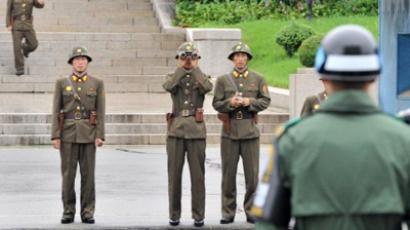‘South Korean naval base to trigger arms race’
Washington's plan to use a new South Korean base for the American Navy has raised harsh criticism in both the USA and South Korea. Policy analyst Christine Ahn fears this could spark Cold War-like tensions in the area.
The South Korean defense ministry commissioned the naval base on Jeju Island in the wake of the 2010 sinking of a South Korean navy vessel and the shelling of another island base some 320 miles to the north. Seoul blames North Korea for the attacks, which took some 50 lives. However, local people who oppose the base say its real purpose is to help the US military project its power against China.However, local people who oppose the base say its real purpose is to help the US military project its power against China, and concern over the base is growing despite the country's defense officials pledging that permanent stationing of US naval vessels at the base will not be allowed. They insist that the facility, which is to be completed in 2015, is meant to deter North Korea, not China. The new base, which lies 50 miles southeast of the South Korean mainland, could jeopardize both America’s and South Korea’s relations with China, which is South Korea’s main trading partner. Washington’s plan to base its fleet there is also likely to exacerbate instability in East Asia, said Ahn, of the Los Angeles-based Korea Policy Institute.“If this base is tied to the US missile defense system, it might be part of the US strategy to contain China,” she said. “Beijing is concerned with the US military getting closer to its territories. This deal is going to foment a regional arms race, which pits Korea in between the US and China.”Whatever number of the American vessels is to turn up at the base, the US presence on the Korean peninsula is already excessive, points out Ahn. The US military exercises that regularly take place in the area are viewed as highly confrontational by North Korea. All this stands in the way of unification of the two Koreas, and President Barack Obama’s recent harsh rhetoric toward North Korea does not add to the peace process. “There is a growing resentment in the two Koreas – and also in Okinawa and Guam,” she concluded. “Everywhere people are saying, ‘We have had enough of the US military occupation – it is time to close down the bases and time to find different ways for achieving security.”Local residents have been demonstrating against the proposed base which they will deter the millions of tourists who come to enjoy the beauty of Jeju Island each year. Besides complicating the geopolitical situation in the area, the base would endanger the environment and rob people of their jobs. But this sentiment seems to have been largely disregarded by the South Korean authorities.US-based peace activists have also gathered in front of the White House in Washington DC on Thursday to protest at the controversial base.
The South Korean president, Lee Myung-back, is currently on a high-profile visit to the United States where he received a red carpet welcome and will enjoy the rare privilege of addressing Congress.














